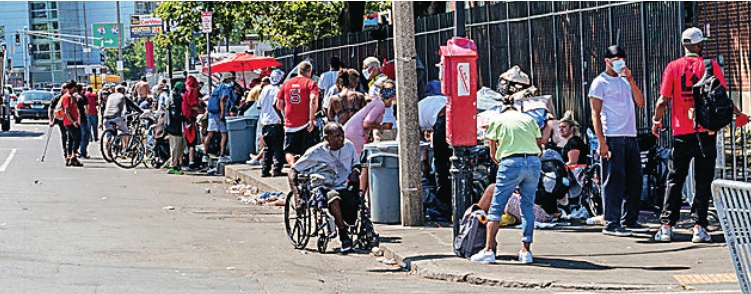

Dire warnings about the consequences of last year’s Mass and Cass tent crackdown seem to have borne fruit as the warm weather brings an influx of unhoused Bostonians to residential neighborhoods.
The June 18 meeting of the South End’s Civic Working Group was dominated by residents recounting how their streets have been overtaken by a wave of public drug use, disruptive congregations and ad-hoc shelters once confined to Atkinson Street.
While last November’s crackdown and shelter surge seems to have been successful getting a roof over everyone’s head for winter and keeping that immediate area clear, it hasn’t dissuaded people from returning to the South End this summer, this time displaced to surrounding neighborhoods.
“The other day at Mass and Harrison there were 40 people congregating just out of view of police. One night there were seven or eight people on my stoop using drugs and bedding down for the night.
My neighbor has to call 911 just to leave his building,” said Worcester Square resident Andrew Brand.
“I like to relax by gardening, but I have to check for needles before I start digging. Sometimes we find people passed out in our garden. Since the tent removal and especially since the weather got warm, it’s just been unbearable.”
Police forces have no trouble clearing congregations when called, but activity resumes soon after law enforcement leaves. The transit police, for example, have taken to parking an occupied cruiser next to the Mass. Ave. subway station, but drug use and temporary encampments are a problem at most momentarily displaced by police intervention.
City officials acknowledged it’s become an issue in recent weeks but seemed to have little to offer by way of solutions.
Dr. Bisola Ojikutu, the executive director of the Boston Public Health Commission, said merely that the city was reexamining its approaches and continuing its existing outreach efforts.
“We know these problems seem to be overwhelming right now, especially since the weather’s gotten better. The crowding’s gotten more challenging, it’s been increasing. It’s at the point where we do need new solutions. We need to evaluate everything on the table, remain open minded and think about what we could be doing differently,” she said. “We’re really at a crisis point.”
Those outreach efforts have been stymied by the fact many congregating already technically have access to shelter but are still out on the street for any number of reasons.
Shelters might not accommodate their families or partners, some don’t feel safe in shelters, some don’t trust city government, some are looking for or using controlled substances, and some are simply trying to socialize and enjoy the company of their friends like any other Bostonian.
The Boston Police Department has taken a consistent stance that the city can’t arrest its way out of dealing with the underlying issues of homelessness and drug addiction. Superintendent Lanita Cullinane did say they were working to find and arrest those propagating the illicit drug trade but cautioned that it’s slow work and so long as demand exists supply will rise to meet it.
The only real long-term solution on the table is the reopening of the Long Island drug recovery campus, the abrupt closure of which and demolition of its bridge over a decade ago helped induce today’s state of permanent crisis.
Chris Osgood, the mayor’s senior advisor on infrastructure, says the city continues to make progress, though the process is inherently slow and Boston is having to fight the city of Quincy at every step.
A hearing on Quincy’s last appeal occurred in late May, with results coming this summer. Osgood was optimistic Boston would prevail, as it has on all previous appeals. Once the Chapter 91 license is in hand, officials will be able to give a better timeline estimate.
At the very least they’ll need a federal consistency review from the Massachusetts Office of Coastal Zone Management and a bridge permit from the US Coast Guard. Any residents looking to give their two cents will have a chance in the public process for that bridge permit.